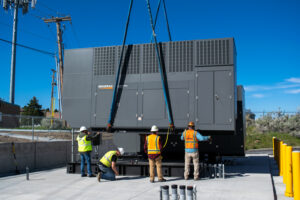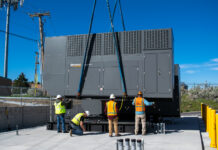How to ensure your generator will start when there is an emergency?
A standby generator is meant to be your backup power source in case of emergency. But what happens when an emergency strikes and your generator fails to start? How are you supposed to get power to your home or business? What if, in a natural disaster, hundreds of other people are having the same problems as you, and you are unable to have a technician come to your rescue? Below, you’ll find a few ways to troubleshoot your generator yourself, and a few maintenance tips to follow before disaster strikes to make sure your gen is ready to go at a moment’s notice.
“Not in Auto”
Before you start tearing apart your generator, look for an alert that says “Not in Auto”. This means that your generator will not automatically start. This is usually the result of someone forgetting to set the generator controls back to “Auto Mode” after routine maintenance.
Batteries
A dead battery is the number one reason for gen failure to start. Technicians recommend that you replace your battery every 2-3 years for the best outcome. Routinely inspect your battery terminals for proper connections and clean off corrosion as needed to prevent issues with your battery. Batteries are also prone to sulfation build up. This occurs when a battery is left with a partial charge for long periods of time. To combat this, periodically check your batteries to make sure they have a full charge, and never store a partially charged battery for long periods of time.
Fuel
Issues with fuel are the second largest reason for generator failure.
- Low fuel is easily solved by adding more fuel.
- Fuel leakages can be fixed by a properly trained maintenance technician by isolating and replacing cracked or unsealed parts.
- Improperly maintained fuel will most likely need to be drained and replaced.
- Low sulfur diesel fuel, although more environmentally friendly, is more susceptible to microbe growth which can plug up your fuel filters. All diesel fuel is susceptible to gelling, microbe growth and fuel instability which are other sources of filter clogging. You can combat these side-effects by regularly inspecting, replacing, or adding certain helpful chemicals to your fuel source.
Coolant
Most generators have a coolant monitoring system that will alarm when the temperature is too high and/or the coolant levels are too low. Sometimes these backup systems can fail, which is why it is critical to check these levels on a regular basis just to be sure you’re not left without power in an emergency. Regularly inspect your whole generator for signs of a leak. Issues with leaking coolant will manifest as puddles under your equipment, or a thin crust covering some of the coolant hoses.
Oil
Improperly maintained oil can cause filters to become clogged and cause your generator to run at a reduced capacity or not run at all. This can be remedied with regularly scheduled oil changes.
Wet stacking is another issue that can arise with standby generators. Wet stacking happens when a generator is not run at its full load capability for long periods of time. This causes oil and other fluids to build up in the exhaust system since the engine is not getting hot enough to burn off these excess fluids. This can be fixed with load banking. A generator technician will come and hook up an artificial load to your generator to get it to run at a higher temp until all the excess sludge burns off.
Air in the Fuel System
Standby generators usually aren’t being used daily. This can cause an excess of air to build up in the fuel lines. This means that when the generator goes to start it will start to suck up the air instead of fuel. To prevent this from happening, you should run your generator for at least five minutes every week, just to verify that the generator will start and run for a little while and the fuel lines are expelled of any air.
Poor Maintenance Schedule
Maintenance can seem like a costly thing when appointment after appointment, there is nothing seriously wrong with your generator. But this is exactly the outcome you are shooting for! Regular maintenance can prevent a myriad of larger issues from occurring. Proper maintenance can help you find small, cheap problems with your generator before they become more expensive problems. Without a proper maintenance schedule, you are asking for your generator not to start when you need it most.
Routine maintenance will solve most of your generator problems before they even begin.
Got More Generator Questions? We Can Help!
Call 800-595-5315 Or Connect With Our Expert Technicians Here:
Other Articles
- Critical Spare Planning
- Where Do I Start On My Generator Installation?
- How can Las Vegas heat lead to generator failures?



Craig is the Vice President of Engineering at Energy Management Corporation. He is a Professional Engineer (PE) and carries over 30 years of experience in the world of electrical automation. Besides amassing an impressive amount of knowledge in his magnificent brain, he is also a Master Scuba Diver (MSD), a performing magician, and a professional DJ. Truly a man of many talents.







